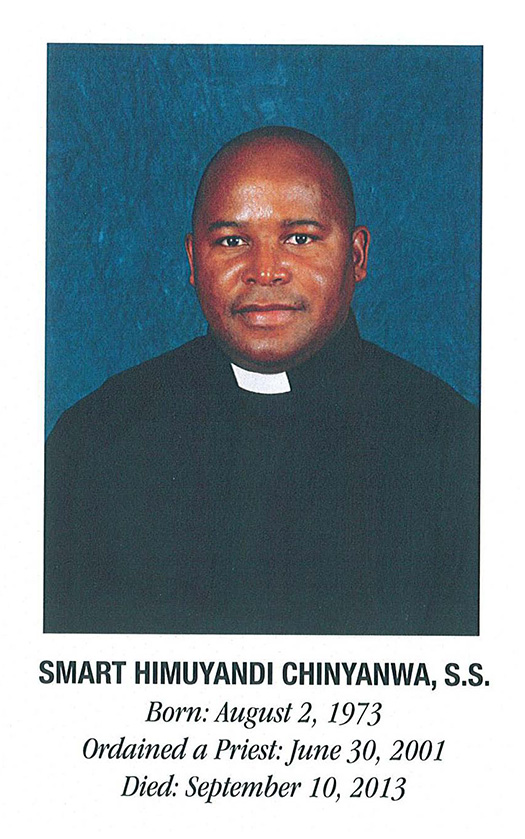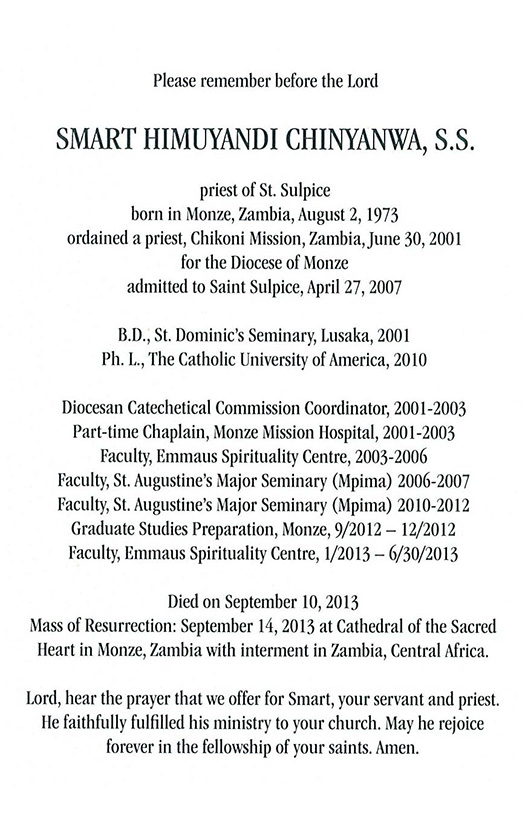Chinyanwa, Father Smart Himuyandi, S.S.
2013, September 10
Date of Birth: 1973, August 2
Each member of the Society of St. Sulpice who passes on to the Lord leaves his mark. Often he makes his mark by living a long life and giving many years of service; but not always. Such is the case with Fr. Smart Chinyanwa who died at forty on September 10, 2013, a priest for twelve years and a Sulpician for six.
Born on August 2, 1973 in Monze, Smart Himuyandi Chinyanwa received his primary and secondary education in Monze. Signs of his leadership ability appeared very early as he was appointed “Head Boy” in his final year at Canisius High School. In 1993, immediately after completing high school, he was accepted at Emmaus Spirituality Centre to start his journey to the priesthood for the Diocese of Monze. He completed his philosophical studies at St. Augustine’s Major Seminary (Mpima) and then proceeded on to theological studies at St. Dominic’s Theologate (Lusaka). On June 30, 2001 he was ordained a priest for the Diocese of Monze by Rt. Rev. Emilio Patriaca at Chikuni Mission.
After his ordination, Fr. Smart was assigned as a Chaplain for Monze Mission Hospital and also served as Diocesan Catechetical Co-coordinator. While holding this position, Fr. Smart lived with and served Bishop Emilio in many ways, not the least of which was to be the editor and “ghost writer” of the Bishop’s homilies and pastoral letters. Bishop Emilio describes the time he lived with Fr. Smart as a time of great blessing. He found Fr. Smart able to listen and understand clearly the ideas of the Bishop and then to develop them into homilies, talks or pastoral letters. At the funeral Mass, the Bishop expressed how he had come to love Fr. Smart so much that it was indeed a great sacrifice for him to allow Fr. Smart to join the Society of St. Sulpice. However, he released him to the Society with an open heart knowing very well that, with the Sulpicians, Fr. Smart would be able to develop his talents and gifts for the good of the whole Church.
As a Sulpician candidate, Fr. Smart served as formator and lecturer at Emmaus Spirituality Centre for three years and then began studies in philosophy in Rome. After a year in Rome, Fr. Smart transferred to The Catholic University of America where he obtained a Licentiate in Philosophy.
In 2010 he returned to Zambia and was assigned to Mpima’s St. Augustine Major Seminary in Kabwe as a formator and lecturer in philosophy. He also taught some philosophy courses in two schools in Lusaka, St. Dominic’s Major Seminary and St. Bonaventure College, a Franciscan formation center that specializes in philosophical studies.
Throughout his short ministry, many people experienced him as a happy, peaceful and joyful person. He was energetic, practical and articulate in everything he did. While hardworking, he never allowed his work to destroy his greater gift of relating with others. He was totally committed to his duties as a formator and teacher, yet he also enjoyed good times with his family and friends. The constant challenge for many African priests and religious is to find a healthy balance between family loyalty and one’s commitment to priesthood and religious life. But Fr. Smart did not seem to be bothered by this dichotomy. He fulfilled his Sulpician ministry effectively while remaining committed to his family as well.
Coming from a polygamous family, he faced many challenges of in-fighting, jealousies and competition that almost divided his family. He was constantly concerned about his family. He showed well-developed Christian maturity in the way he worked hard to be a source of unity among the different members of his family by healing wounds and reconciling divisions there. While he worked hard to face the challenges of his family, he never forgot his bigger responsibilities as a priest. He was committed to his work as a formator and went beyond the borders of the seminary to become a priest for all.
Fr. Smart lived his life as a Sulpician priest in a way that will remain a shining example for all his Sulpician confreres. Though Fr. Smart had been released by his Bishop to work in the seminary as a Sulpician, he never used that as an excuse to run away from his obligations as a diocesan priest or to lose contact with his home diocese.
Though he was very happy and proud to be a Sulpician priest, he remained solidly grounded in his own diocese. He had very close relationships with the priests of his home diocese to which he remained very loyal. He maintained a very good relationship with his Bishop, who became his personal friend.
Fr. Smart had a profound sense of community life. While enjoying good relationships with his seminary community, he also was pastorally connected to a wide group of people beyond the boundaries of the seminary. He was well recognized as a great teacher and preacher. His homiletic reflections were a sign of the depth of his spiritual life. It was not surprising to anyone who knew him why so many people looked to him for spiritual guidance. In fact, he was called upon to help in a number of parishes around Lusaka and in his own diocese to lead days of recollection, Novenas, and to preach retreats.
It is an understatement to say that Fr. Smart was highly gifted intellectually. His special interest was in philosophical studies. He was a voracious reader of novels and philosophical literature. An example of his intellectual gifts is how he surprised the Provincial Council by completing his Ph.L. studies at The Catholic University of America in only two years, a timeframe earlier than anticipated.
A common desire among African priests is to study or work in Europe or America where the options are better. It is also common knowledge that some of the African priests who have gone to Europe or America for studies have not returned home. At the time Fr. Smart was deciding where to go for his Ph.D. in philosophy, he knew very well that there would be many advantages for him if he returned to America or Europe. But he surprised his confreres by giving preference to studying in Africa; something that many African priests would not do. He first looked for a university in South Africa. Unfortunately, no university there would take him for the type of studies he wanted to do. Then he considered studying at the University of Zambia, but they did not have a Ph.D. program in philosophy. Only after he felt that he had exhausted all options in Africa did he entertain the idea of returning to Europe. He was accepted for doctoral studies in philosophy at Sheffield University in England, but died before he could go there. His great interest in and the efforts he made to do graduate work in Africa, however, showed the greatness of his spirit. He was a man solidly grounded in who he was and very proud to be an African priest living and serving in Africa.
One of Fr. Smart’s closest friends gave a speech at Fr. Smart’s funeral that summarizes well the legacy of the mind, the manner, and the man his friends came to know as Fr. Smart Chinyanwa. Using the anagram of his name, Fr. Smart was eulogized as: simple, because he did not allow his intelligence to keep him from mixing with people of all classes; mature, because he handled deftly the complexities of life; articulate, because he communicated complex ideas in ways others could easily understand; reliable, because when he said “Yes” to any assignment, everyone could be sure that he would carry it out to the best of his abilities; and teacher, because he took time to prepare and was loved by his students.
On September 14, 2013, Fr. Smart was buried in Monze following a Mass of the Resurrection filled to overflowing outside the Cathedral of the Sacred Heart. Fr. Tom Ulshafer, S.S., Provincial of the U.S. Province, was in attendance representing the Province. Fr. Smart’s close friend, Bishop Emilio Patriaca of the Diocese of Monze presided and the homily was given by Fr. Cornelius Hankomoone, S.S., Regional Superior of the Zambian Sulpicians.
Rev. Cornelius Hankomoone, S.S.
Regional Superior of Sulpicians in Zambia


